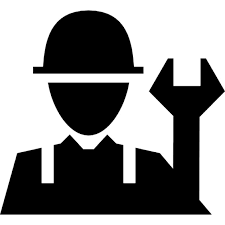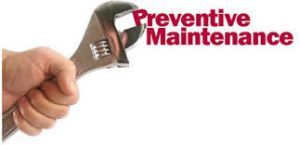Maintenance
Maintenance we nt through different stages of development, with the beginning of the Industrial Revolution and until recently, the common method of maintenance was the reaction method, meaning that when the machine broke down, we repaired it, but if the machine was working well then no activity related to maintenance was done.
nt through different stages of development, with the beginning of the Industrial Revolution and until recently, the common method of maintenance was the reaction method, meaning that when the machine broke down, we repaired it, but if the machine was working well then no activity related to maintenance was done.
That is, during this period the concept of maintenance was: to repair the equipment if it broke down.
However, with the development of the industry, the need to take some measures arose to avoid the problems that were occurring due to the use of the reaction method in maintenance, such as: the stoppage of production for large periods in order to repair large periods, and the possibility of large losses in machines or in lives as a result of sudden and unexpected failure, and from Here came the thinking about preventive maintenance, the idea of which is based on the fact that each machine and each of its parts has a certain life span that can be roughly calculated. Therefore, before the end of its life span, it is replaced and thus avoids the occurrence of many unexpected breakdowns that were previously occurring.
 However, the possibility of unforeseen malfunctions is still possible, as the machine may be exposed to harsh operating conditions, which speeds up the time of damage to one of its parts, and the possibility of changing and replacing some parts while they are in good condition is possible, which means a great material loss.
However, the possibility of unforeseen malfunctions is still possible, as the machine may be exposed to harsh operating conditions, which speeds up the time of damage to one of its parts, and the possibility of changing and replacing some parts while they are in good condition is possible, which means a great material loss.
Therefore, a newer approach has been considered, predictive maintenance, which relies on monitoring the machine’s condition in order to predict faults that may occur before they occur.
Maintenance at the moment
Currently in the industry, all the aforementioned types of maintenance are combined, so it does not mean that predictive maintenance is the latest of these methods to be used in all equipment as the cost of establishing predictive maintenance systems is very expensive so it is applied only to critical equipment i.e. expensive equipment or that. Which is pivotal in the production process and the whole plant can be stopped in the event of failure of these machines.
As for the rest of the equipment, preventive maintenance schedules can be made for it, especially if this equipment has a calculated lifespan, and there are also some equipment or parts that can be left to work without any maintenance until a malfunction occurs and it is repaired and these equipment are the unimportant equipment, that is, stopping it does not entail. A productive process for which the cost of doing preventive or predictive maintenance is greater than the cost of repairing it.
Modern maintenance management systems have been developed, such as integrated maintenance, which is based on combining different maintenance methods, as previously explained, as well as full productive maintenance, in which the production system is linked with the maintenance system in order to achieve maintenance goals, which are also consistent with the production objectives of the industrial facility. The introduction of the so-called computerized maintenance management systems, which are programs that organize maintenance within the industrial facility in order to improve the level of maintenance in general.
The importance of maintenance in industrial companies
 • Efforts in industrial companies have focused on upgrading maintenance systems, with the aim of preserving the capital invested in equipment, raising the efficiency of its use, and achieving the highest possible productivity while reducing the cost of production.
• Efforts in industrial companies have focused on upgrading maintenance systems, with the aim of preserving the capital invested in equipment, raising the efficiency of its use, and achieving the highest possible productivity while reducing the cost of production.
• The scientific development in recent years and the accompanying economic development, open markets, global competition and crowding out in the markets, not only in the global or regional markets, but also in the local markets .. All of this has led to a change of concepts in managing production and maintenance systems and working to achieve the highest efficiency Productivity of equipment and focus on reducing maintenance cost in order to obtain a product of high quality and competitive price, and maintenance costs play a major role in the cost of production, which in some factories amounts to more than 25% of the production cost, and any shortening in maintenance will be accompanied by a decrease in hours Operation of equipment and low productivity, and consequently failure to achieve production plans, its high cost, inability to compete, and consequently a decrease in the market share of the company, accompanied by the emergence of a number of problems related to maintenance, including the increase in the need to conduct repair programs at close intervals in addition to the need to perform replacement of equipment parts before the end of their useful life Due to lack of concern for maintenance.
• The maintenance and attention to it has become a basic factor for the success of any industrial company in achieving its set goals of expansion and development of equipment. Companies are now interested in developing maintenance programs, introducing preventive maintenance concepts, predictive maintenance, fault analysis, computer system programming, controlling spare parts consumption rates in order to achieve the highest possible productivity of equipment and reduce maintenance costs to the lowest possible level.
• Likewise, maintenance is no longer an independent activity isolated from the maintenance activities of various factories. Rather, the concept of comprehensive productive maintenance has been applied through a management method that involves everyone in the factory by taking advantage of the equipment and assets.
Advantages of implementing a good maintenance regime
• The interest in introducing modern maintenance systems, developing existing maintenance programs, paying attention to the documentary cycle for each system, measuring maintenance activities and using computers to connect the elements of various maintenance systems, analyzing faults and making the necessary improvements that cause these faults to prevent their recurrence, setting performance rates and following up on their achievement and interest in raising the efficiency of The performance of maintenance teams, all of these factors combined will help to achieve the main objectives of maintenance, which are: –
Reducing maintenance costs.
• Achieving higher productivity.
Reducing downtime.
• Extending the period of time between reforms
• Extend the life of the equipment
Increase productivity.
• The high quality of products.
 • Therefore, modern systems have been concerned with implementing the concept of (Production Maintenance System), and this concept focuses on achieving full cooperation between maintenance systems and production systems to achieve the goals of the company through joint work systems and programs and goals to be achieved represented in providing products of the required quality, in the target quantity, on time and at the lowest costs. It guarantees the safety of workers, equipment and assets. To achieve this, it takes the adoption of effective policies and methods .. The Total Quality Management is one of these policies that most companies have been quick to adopt and implement to ensure the quality of their products .. In return, the efforts made by these companies to reduce the cost of manufacturing products .. also resulted in To develop policies and methods for maintenance management, with the most effective being through which the production of the target quantity can be confirmed and that prevents or reduces unplanned flows in production lines and thus obtaining an optimal use of the available time. Maintenance alone is not responsible for ensuring the production of the target quantity of products on time, considering that is a general goal of the organization Therefore, maintenance methods have evolved until they are parallel to a large extent with the concept of good quality management Hoping, then, all the members of the organization and its divisions will also be involved in assuming the responsibility of managing and maintaining its assets and equipment through adopting the philosophy of comprehensive production maintenance management (TPM).
• Therefore, modern systems have been concerned with implementing the concept of (Production Maintenance System), and this concept focuses on achieving full cooperation between maintenance systems and production systems to achieve the goals of the company through joint work systems and programs and goals to be achieved represented in providing products of the required quality, in the target quantity, on time and at the lowest costs. It guarantees the safety of workers, equipment and assets. To achieve this, it takes the adoption of effective policies and methods .. The Total Quality Management is one of these policies that most companies have been quick to adopt and implement to ensure the quality of their products .. In return, the efforts made by these companies to reduce the cost of manufacturing products .. also resulted in To develop policies and methods for maintenance management, with the most effective being through which the production of the target quantity can be confirmed and that prevents or reduces unplanned flows in production lines and thus obtaining an optimal use of the available time. Maintenance alone is not responsible for ensuring the production of the target quantity of products on time, considering that is a general goal of the organization Therefore, maintenance methods have evolved until they are parallel to a large extent with the concept of good quality management Hoping, then, all the members of the organization and its divisions will also be involved in assuming the responsibility of managing and maintaining its assets and equipment through adopting the philosophy of comprehensive production maintenance management (TPM).
The concept of preventive maintenance
The implementation of the preventive maintenance system has become one of the main activities in maintenance, in order to preserve the capital invested in equipment and machinery and to ensure its continued operation with the highest possible efficiency, and to apply preventive maintenance programs using the computer with linking these programs with the programs of spare parts and repairs leading to the achievement of many advantages related to raising Efficient performance, reducing maintenance cost, detecting defects before their occurrence, controlling inventory control activities, and making use of available working hours for workers in the maintenance department.
Preventive maintenance
 The shift in the maintenance concept from repair after a breakdown to planning for repairs before the breakdown occurs is the main goal of any maintenance department in industrial companies.
The shift in the maintenance concept from repair after a breakdown to planning for repairs before the breakdown occurs is the main goal of any maintenance department in industrial companies.
Maintenance management in our modern era no longer applies methods of treating faults after their occurrence .. because this process has become very costly in today’s world that depends on competition, quality and product price, and there is a rule that maintenance workers know:
If you don’t control maintenance, maintenance will control you
That is, if you are not able to control maintenance, maintenance will take over control of you.
The maintenance department at the present time has relied on the application of modern concepts of maintenance and the associated systems and organizations for maintenance and the reliance on integrated maintenance systems called comprehensive production maintenance systems includes a set of major computerized maintenance systems-CMMS, which mainly depends on the application of the program For preventive maintenance, predictive maintenance, a program for planned repair and overhauls, a program for spare parts and inventory control, in addition to a maintenance information program that provides the information needed to plan and manage maintenance programs and follow up on their results .. In addition to implementing a set of other systems related to the basic set of maintenance systems. Which works to support it to achieve its goals. Such as a group of programs (predictive maintenance – corrective maintenance – productive maintenance). All these packages of systems help achieve maintenance goals, which seek to achieve:
Equipment with maximum readiness for operation.
Achieving the longest possible life of the equipment.
This should be accompanied by a minimum cost.
This will help to achieve a comprehensive approach at the company level that aims to achieve standard performance by raising the overall effectiveness of equipment, machinery and processes to a global competitive level .. Therefore, paying attention to the comprehensive productive maintenance method leads to a little amount of maintenance, which helps to reduce its cost through most documentation procedures. Training … and building a complete system for preventive maintenance with improvement and the participation of equipment operators in maintenance activities.
Definition of preventive maintenance
It is a set of checks and services that are carried out on the equipment periodically according to a specific time plan to prevent sudden defects, discover the defect before it occurs, and operate the equipment as long as possible.
The preventive maintenance operations are defined daily, weekly, and monthly, where the virtual periodic inspection of the parts and units of the machine is done, cleaning, lubrication and oiling operations are carried out and some simple parts changed if necessary.
Preventive maintenance is one of the most important types of maintenance, and all institutions and bodies have been alerted to this and most of them have tended to apply it in all their departments.
The importance of preventive maintenance as one of the integrated maintenance systems
- Preventive maintenance is the gateway to an integrated maintenance system
- Preventive maintenance helps spot defects before they occur and prevent sudden stops
- Preventive maintenance helps to better plan maintenance workers when implementing repair programs
- Preventive maintenance supports the concept of a building of technology in maintenance
- The introduction of the concept of maintenance prevention – predictive maintenance – failure analysis confirms the success of preventive maintenance programs
- Preventive maintenance helps to prepare better planning for repair and overhaul programs and to identify the needs of spare parts, which enhances the application of the concept of comprehensive productive maintenance.
- Preventive maintenance helps to follow up on the status of equipment, whether by observation and monitoring or by using the concept of predictive maintenance to discover any malfunctions before their occurrence and thus preparing to set the appropriate stop date and provide the necessary spare parts for the repair and provide the necessary labor and equipment and in general, any maintenance program needs to be
what must be done?
when must be done ?
How must be done ?
who will be responsible ?
How much time?
The success of any preventive maintenance program depends on a set of factors, the most important of which are:
 A- Supporting senior management to implement the program
A- Supporting senior management to implement the program
B- Preparing a suitable organization for preventive maintenance
C- Designing a program for preventive maintenance that can be used on a computer
D- Preparing a suitable code system for the equipment
C- A thorough study of program inputs, such as a maintenance quantity and a repetition rate for the maintenance quantity activities
H- Continuously developing program inputs according to work conditions
G- Analyzing faults periodically to monitor their causes and prevent their recurrence
D- Use the predictive maintenance method whenever possible
With the need to benefit from information on preventive maintenance to plan repair and overhaul programs.
Involving production workers in carrying out the daily routine maintenance work
Training maintenance teams on the information contained in the equipment’s operating manuals
Pay attention to the realistic requirements for the equipment, which may differ from one machine to another
Increase the awareness of all employees of the company about the culture of maintenance
Training maintenance personnel on procedures that go beyond what is contained in the operating manuals
Preparing a design system with maintenance to deal with equipment that requires less maintenance and applying the concept of productive maintenance.
Arab Iron and Steel Union has been providing its services in the application of the preventive maintenance system by computer for more than 25 years, as preventive maintenance has been applied in many companies and the union is honored to provide a free study on the possibility of applying the preventive maintenance system program on the computer and to give a free lecture in the field of the maintenance system Preventive computer wishing companies.
To contact the Cairo office
Phone: 01117320090
Email: [email protected]









